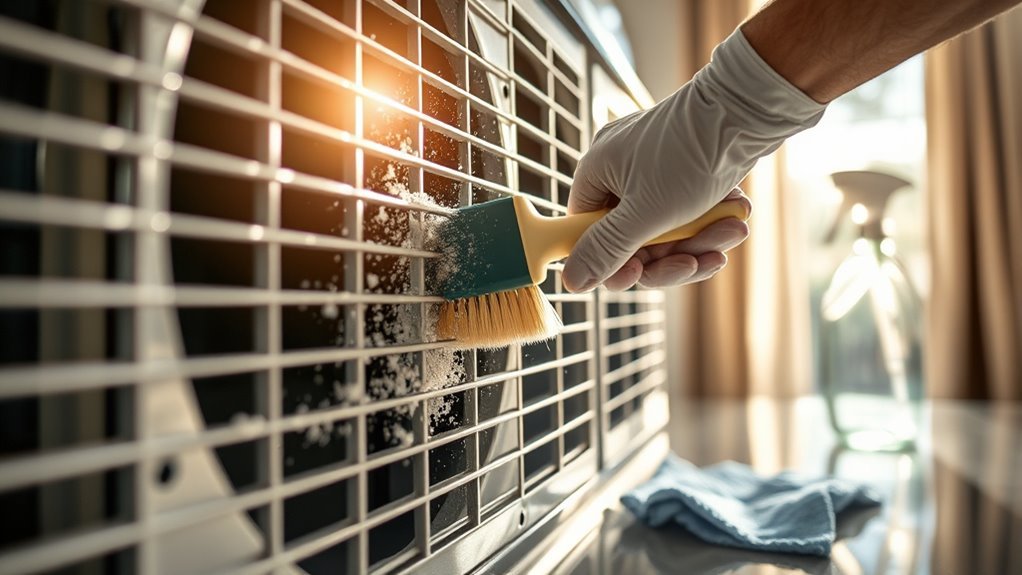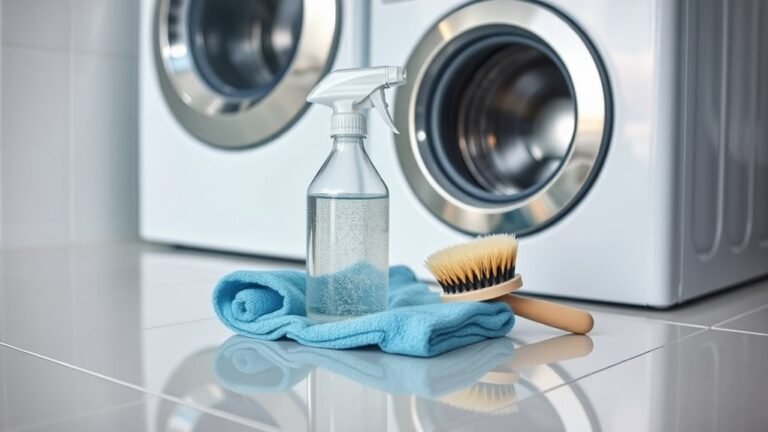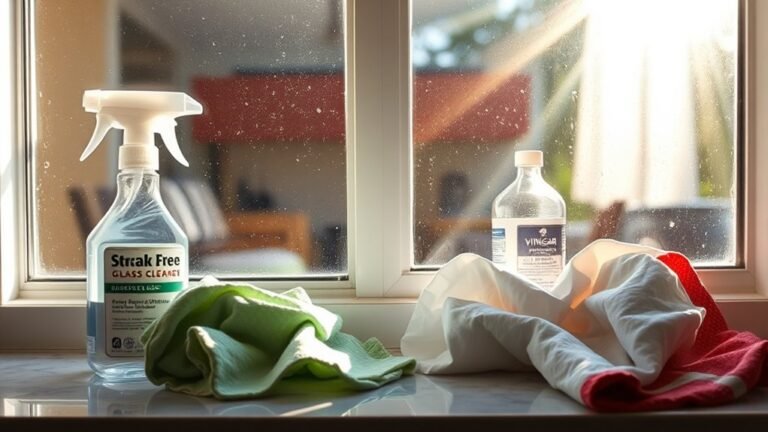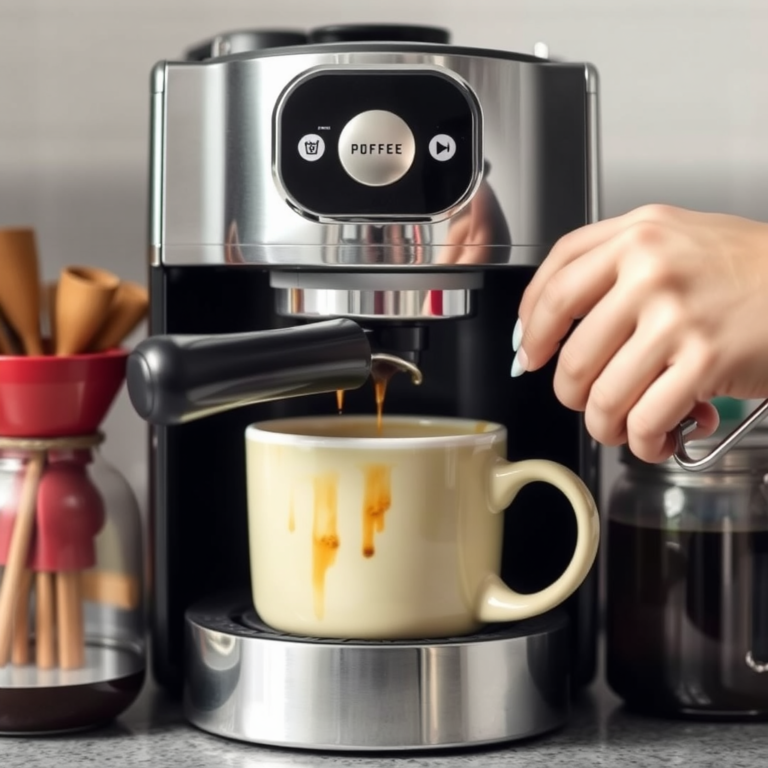Cleaning Techniques for AC Owners
To keep your AC running well, start by inspecting and replacing your air filters every 30 to 90 days. Clean the evaporator and condenser coils carefully to maintain airflow and efficiency. Don’t forget to clear the drain line with vinegar monthly to avoid clogs. Dust and vacuum air vents to improve air quality, and check the blower fan for dust and damage. Want to extend your AC’s life even more? There are a few other essential steps you should know.
Inspecting and Replacing Air Filters

One of the easiest ways to keep your AC running efficiently is by inspecting and replacing its air filters regularly. You’ll find various filter types—fiberglass, pleated, and washable—that suit different needs. Choosing the right one gives you control over air quality and system performance. Don’t let clogged filters hold you back; they restrict airflow and force your unit to work harder. Replacement frequency depends on your lifestyle and environment—typically every 30 to 90 days. If you have pets or allergies, check filters more often to maintain freedom from dust and irritants. By staying on top of filter care, you guarantee your AC breathes easy, saving energy and extending its life. It’s a simple step toward comfort and independence.
Cleaning the Evaporator and Condenser Coils
Two key components that often get overlooked during AC maintenance are the evaporator and condenser coils. Keeping these coils clean is essential to guarantee your system runs efficiently and doesn’t waste energy. Dirt and debris build-up on these coils restrict airflow and reduce cooling power, which means you’ll end up paying more for less comfort. For effective coil cleaning, gently brush away dirt or use a no-rinse coil cleaner designed for your unit. Remember to turn off your AC before starting any work. Regular coil cleaning not only boosts performance but also extends your AC’s lifespan. Incorporate these maintenance tips into your routine, and you’ll enjoy the freedom of a cool, reliable home without unexpected breakdowns or high energy bills.
Clearing and Cleaning the Drain Line
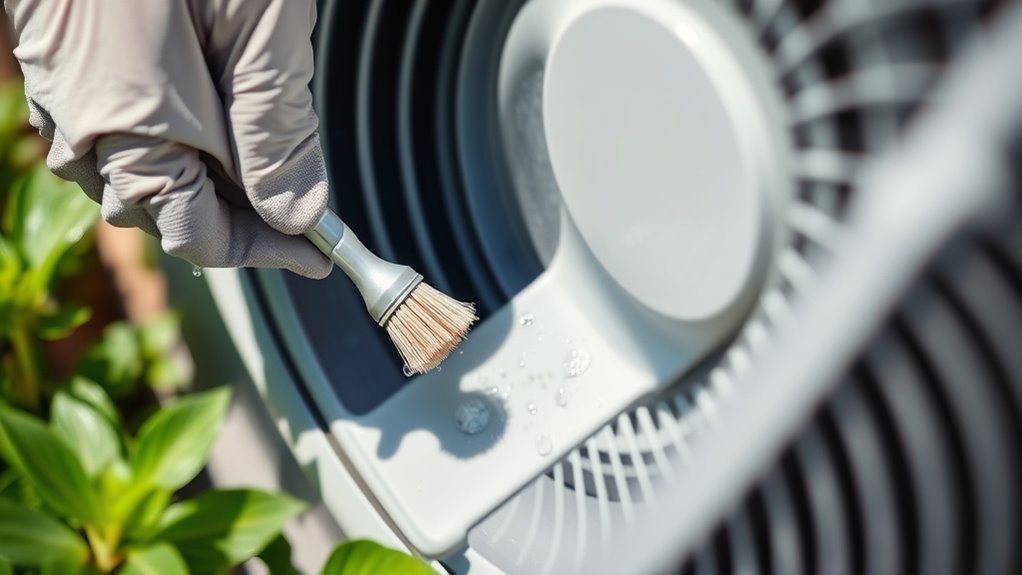
You’ll want to check your drain line regularly for blockages that can cause water buildup and damage. Using vinegar is an easy and effective way to clean the line and keep it flowing smoothly. With simple maintenance, you can prevent future clogs and keep your AC running efficiently.
Identifying Drain Line Blockages
Although drain line blockages can be tricky to spot at first, recognizing the signs early can save you from costly repairs. Your AC’s drain line is essential for preventing water damage, so staying alert is key. Here’s what to watch for:
- Water pooling around your AC unit or near walls
- A musty or moldy smell inside your home
- Reduced cooling efficiency or unexpected shutoffs
- Slow draining or gurgling sounds from the drain pipe
If you notice any of these, it’s time to inspect or clear the drain line. Catching blockages early means you keep your freedom from expensive fixes and avoid water damage that can mess with your space. Stay ahead, and your AC will keep running smoothly.
Using Vinegar for Cleaning
When you spot signs of a blocked drain line, one of the simplest and most effective solutions is cleaning it with vinegar. This natural cleaner offers impressive vinegar benefits, breaking down buildup and eliminating mold without harsh chemicals. Just pour a cup of white vinegar slowly into the drain line and let it sit for about 30 minutes. The acidity naturally dissolves debris and keeps your system flowing freely. Afterward, flush the line with water to clear any loosened grime. Using vinegar means you’re choosing a safe, eco-friendly method that protects your AC and your freedom from costly repairs. Regular vinegar treatments help maintain clear lines, so you’re not stuck dealing with unexpected clogs or downtime. It’s an easy way to keep your AC running smoothly on your terms.
Preventing Future Clogs
Since clogged drain lines can cause serious damage to your AC system, staying ahead with regular clearing and cleaning is essential. You want your drain pan and lines free from blockages to guarantee effective moisture management and prevent leaks or mold. Here’s how to keep your system running smoothly:
- Flush the drain line monthly with a vinegar solution to dissolve buildup.
- Check the drain pan regularly for standing water or debris.
- Use a wet/dry vacuum to clear stubborn clogs in the drain line.
- Confirm the drain line has a proper slope for easy water flow.
Dusting and Vacuuming Air Vents and Registers
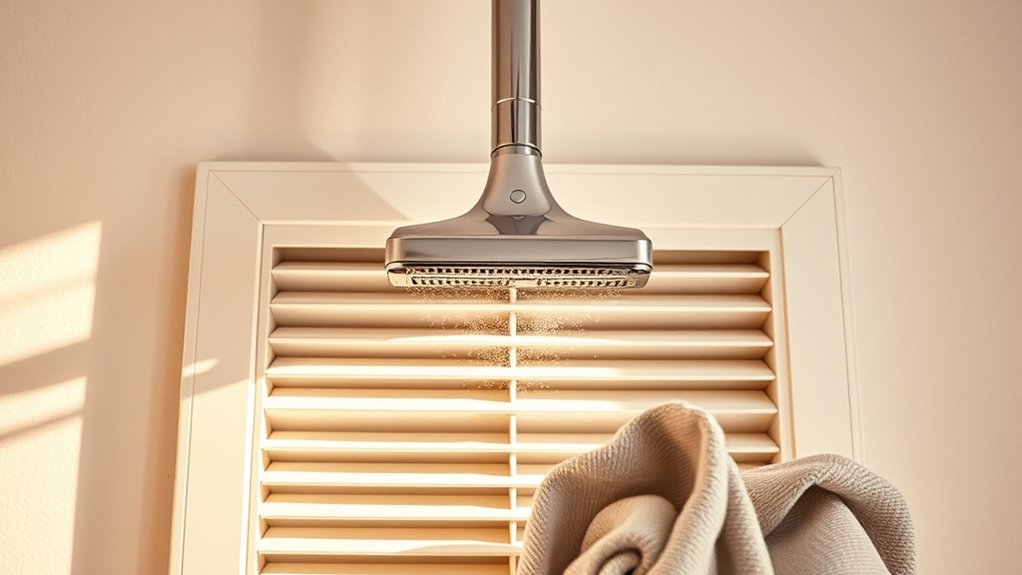
To keep your AC running smoothly, you’ll want the right tools for dusting air vents and registers, like a microfiber cloth or a soft brush. Using your vacuum with a brush attachment helps remove stubborn dust without damaging the vents. Let’s look at how to do this properly to keep your airflow clean and efficient.
Tools for Effective Dusting
Although dusting air vents and registers might seem straightforward, having the right tools makes the job much easier and more effective. When you’re aiming for freedom from dust buildup, the right gear lets you breeze through your cleaning without hassle. Here are essentials to keep handy for superior dusting techniques:
- Microfiber cloths: gentle yet efficient at trapping dust without scattering it.
- Extendable dusters: reach deep inside vents and tricky corners with ease.
- Soft-bristle brushes: loosen stubborn dust without damaging surfaces.
- Compressed air cans: blow out dust from tight spaces you can’t reach.
With these tools, you’ll maintain cleaner air vents effortlessly, ensuring your AC runs smoothly and your space stays fresh. Grab them, and enjoy the freedom of a dust-free home!
Proper Vacuuming Techniques
Once you’ve dusted your air vents and registers with the right tools, vacuuming is the next step to remove lingering dust and debris. Start by selecting vacuum attachments designed for tight spaces—usually a brush or crevice tool works best. Gently run the vacuum along each vent and register, following the airflow direction to avoid pushing dust deeper inside. This guarantees a thorough clean without disrupting your system’s efficiency. Don’t rush; moving slowly lets the vacuum capture particles stuck in corners or crevices. Remember, consistent vacuuming preserves your indoor air quality and gives you freedom from clogged vents affecting performance. With these simple, precise steps, you’ll keep your AC running smoothly and breathe easier in your space.
Checking and Cleaning the Blower Fan
One crucial step in maintaining your AC’s efficiency is checking and cleaning the blower fan. Keeping this component in top shape guarantees smooth airflow and prevents unexpected breakdowns. When you tackle blower fan maintenance, you regain control over your comfort and energy use. Here’s how to get started:
- Turn off power before accessing the fan to stay safe.
- Remove dust and debris using a soft brush or vacuum.
- Check for any damage or loose parts to avoid issues.
- Adjust fan speed settings if airflow feels weak or uneven.
Using Protective Covers and Scheduling Professional Maintenance
If you want to protect your AC unit from dirt and weather damage, using protective covers is a smart move. They shield your system during off-seasons, keeping debris and moisture out so your unit stays ready to cool when freedom calls. Alongside covers, scheduling professional maintenance guarantees your AC runs efficiently, preventing costly breakdowns and extending its lifespan.
| Task | Benefit |
|---|---|
| Use protective covers | Blocks dirt and weather |
| Clean debris | Improves airflow |
| Check refrigerant | Maintains cooling efficiency |
| Inspect electricals | Prevents unexpected failures |
| Schedule maintenance | Keeps unit running smoothly |
Frequently Asked Questions
Can I Use Vinegar to Clean My AC Coils Effectively?
You can definitely use vinegar for coil cleaning, and it’s a popular choice because of vinegar benefits like its natural antibacterial and antifungal properties. It helps break down dirt and grime without harsh chemicals, giving you a safer, eco-friendly option. Just mix white vinegar with water, spray it on the coils, and let it sit before rinsing. This method keeps your AC efficient while giving you the freedom to maintain it yourself.
How Often Should I Run My AC to Prevent Mold Growth?
You might think running your AC constantly invites high energy bills, yet regular use actually helps mold prevention by keeping humidity control in check. Don’t let your system sit idle for too long—running it at least a few hours daily can stop moisture buildup, which mold loves. By balancing usage, you free yourself from mold worries and create a healthier, fresher space without sacrificing comfort or independence.
What Is the Best Way to Store My AC Unit During Winter?
When it comes to winter storage, you’ll want to make certain your AC unit is clean and dry to prevent damage. Start by draining any water and cleaning the filters. Cover the unit with a breathable, waterproof cover to keep out moisture and debris. Store it in a dry, sheltered spot if possible. Regular unit maintenance before winter storage will help your AC stay in great shape, so it’s ready to run freely when warm weather returns.
Can Essential Oils Be Used in an AC for a Fresh Scent?
Imagine you’re in a Victorian parlor, wanting fresh air without choking on smoke—essential oils can help you achieve that freedom today. You can use essential oils to freshen your AC’s airflow, but don’t put them directly into the unit; they might damage components or reduce air quality. Instead, try a diffuser nearby or use AC-specific scent pads. This way, you control your environment without compromising your system’s health or your freedom to breathe easy.
How Do I Safely Clean the AC Remote Control?
To safely clean your AC remote control, start by removing the batteries to avoid damage. Use a soft cloth slightly dampened with a mix of water and mild soap to wipe the buttons and surface—don’t let moisture seep inside. For remote maintenance, avoid harsh chemicals and never submerge it. Regularly cleaning your remote keeps it responsive and fresh. These cleaning tips help you stay in control without hassle or restrictions.
